

The Best Science-Backed Mindfulness Practices for Stress. Health and Mindfulness. Brain study shows why mindfulness eases pain. 4-7-8 Breathing: How It Works, How to Do It, and More. Time. Brain activity and meditation. Research on meditation. Scenes of Inner Taksang, temple hall, built just above the cave where Padmasambhava is thought to have meditated Research on the processes and effects of meditation is a growing subfield of neurological research.[1][2][3][4][5][6] Modern scientific techniques and instruments, such as fMRI and EEG, have been used to see what happens in the body of people when they meditate, and how their bodies and brain change after meditating regularly.[2][7][8][9][10] Since the 1950s hundreds of studies on meditation have been conducted, though many of the early studies were flawed and thus yielded unreliable results.[11][12] More recent reviews have pointed out many of these flaws with the hope of guiding current research into a more fruitful path.[13] More reports assessed that further research needs to be directed towards the theoretical grounding and definition of meditation.[11][14]
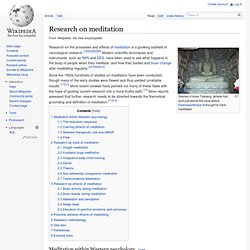
Meditation. Meditation can be defined as a practice where an individual focuses their mind on a particular object, thought or activity to achieve a mentally clear and emotionally calm state.[1] Meditation may be used to reduce stress, anxiety, depression, and pain.[2] It may be done while sitting, repeating a mantra, and closing the eyes in a quiet environment.

Meditation has been practiced since antiquity in numerous religious traditions and beliefs. Since the 19th century, it has spread from its Indian origins to Western cultures where it is commonly practiced in private and business life. Meditation is under psychological, neurological, and cardiovascular research to define its possible health effects. Etymology[edit] The English meditation is derived from the Latin meditatio, from a verb meditari, meaning "to think, contemplate, devise, ponder".[3] History[edit] Man Meditating in a Garden Setting Buddhist monk meditating in a waterfall setting Modern definitions[edit] Jneurosci. Pnas. Even Beginners Can Curb Pain With Meditation : Shots - Health News. Brain activity and meditation. Meditation and its effect on brain activity and the central nervous system became a focus of collaborative research in neuroscience, psychology and neurobiology during the latter half of the 20th century.
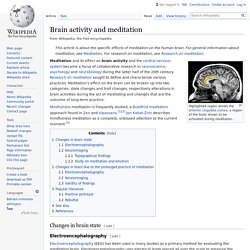
Research on meditation sought to define and characterize various practices. J.neubiorev.2014.03. מדיטציה. Stanford scholar tracks meditation's migration from ancient Buddhist monasteries to your local yoga class. Why this '5-4-3-2-1' mindfulness trick is said to be so effective at helping beat anxiety. When anxiety starts to takeover, it can feel impossible to gain perspective and get out of the spiral of worries.

But, next time you feel overwhelmed with anxious thoughts, a simple mindfulness trick may offer some relief. Shared by Boston University clinical psychologist Ellen Hendriksen, author of new book How to Be Yourself: Quiet the Inner Critic and Rise Above Social Anxiety, this hack can help you stay in the moment when anxiety arises. Advertisement - Continue Reading Below. Do Less, Accomplish More - Tricycle: The Buddhist Review. THERE IS AN OLD story of a man riding very fast on a horse.

As he rides past his friend standing on the side of the road, the friend yells, “Where are you going?” The rider turns toward his friend and yells, “I don’t know, ask the horse!” The pace and intensity of our lives, both at work and at home, leave many of us feeling like the person riding that frantically galloping horse. Our incessant busyness—too much to do and not enough time; the pressure to tick off items on our to-do list by each day’s end—seems to decide the direction and quality of our existence. But if we approach our days in a different way, we can consciously change this out-of-control pattern.
This may sound easy, but doing less can actually be very hard. Where's the Proof That Mindfulness Meditation Works? The concept of mindfulness involves focusing on your present situation and state of mind.

This can mean awareness of your surroundings, emotions and breathing—or, more simply, enjoying each bite of a really good sandwich. Research in recent decades has linked mindfulness practices to a staggering collection of possible health benefits. Tuning into the world around you may provide a sense of well-being, an array of studies claim. Multiple reports link mindfulness with improved cognitive functioning. One study even suggests it may preserve the tips of our chromosomes, which whither away as we age.
Yet many psychologists, neuroscientists and meditation experts are afraid that hype is outpacing the science. The new paper cites a 2015 review published in American Psychologist reporting that only around 9 percent of research into mindfulness-based interventions has been tested in clinical trials that included a control group. Different Types Of Meditation Change Different Areas Of The Brain, Study Finds. Mindfulness Isn’t the Answer to Everything. Here’s When It Helps. Mindfulness Is More Than A Buzzword: A Look Behind The Movement. 10 best meditation apps for Android - Android Authority. How Meditation And Yoga Can Alter The Expression Of Our Genes.
Matt Killingsworth: Are We Happier When We Stay In The Moment? Part 2 of the TED Radio Hour episode Simply Happy.
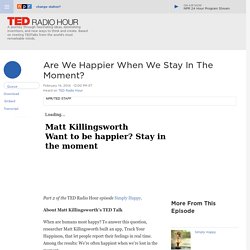
About Matt Killingsworth's TED Talk When are humans most happy? To answer this question, researcher Matt Killingsworth built an app, Track Your Happiness, that let people report their feelings in real time. Among the results: We're often happiest when we're lost in the moment. About Matt Killingsworth Researcher Matt Killingsworth designs studies that gather data on happiness. Guided Meditations. The Power of Meditation and How It Affects Our Brains. 4.8K Flares Filament.io 4.8K Flares × Ever since my dad tried to convince me to meditate when I was about 12, I’ve been fairly skeptical of this practice.
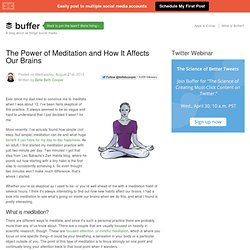
It always seemed to be so vague and hard to understand that I just decided it wasn’t for me. Mindfulness meditation training changes brain structure in eight weeks. Participating in an 8-week mindfulness meditation program appears to make measurable changes in brain regions associated with memory, sense of self, empathy and stress.

In a study that will appear in the January 30 issue of Psychiatry Research: Neuroimaging, a team led by Massachusetts General Hospital (MGH) researchers report the results of their study, the first to document meditation-produced changes over time in the brain's grey matter. "Although the practice of meditation is associated with a sense of peacefulness and physical relaxation, practitioners have long claimed that meditation also provides cognitive and psychological benefits that persist throughout the day," says Sara Lazar, PhD, of the MGH Psychiatric Neuroimaging Research Program, the study's senior author.
Mindfulness meditation improves connections in the brain. When I’m stressed, I listen to a 20-minute mindfulness meditation tape.
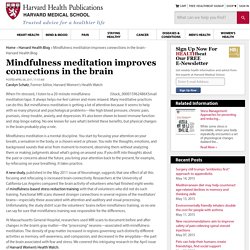
It always helps me feel calmer and more relaxed. Many meditative practices can do this. But mindfulness meditation is getting a lot of attention because it seems to help with so many physical and psychological problems—like high blood pressure, chronic pain, psoriasis, sleep trouble, anxiety, and depression. It’s also been shown to boost immune function and stop binge eating. No one knows for sure what’s behind these benefits, but physical changes in the brain probably play a role. Mindfulness meditation is a mental discipline. Brain waves and meditation. From universities, journals, and other organizations Date:
The State of Mindfulness Science. During the past two decades, more and more scientists have studied mindfulness—a Buddhist-inspired collection of practices aimed at helping us to cultivate moment-to-moment awareness of ourselves and our environment. Their early findings triggered an enormous amount of enthusiasm for meditation. Sometimes, however, journalists and even scientists (who should know better) have overstated the physical and mental health benefits, which has fed growing skepticism about mindfulness. This essay was adapted from Greater Good content for the January issue of Lion's Roar: Buddhist Wisdom for Our Time. Subscribe now! The Benefits of Meditation. The brain waves of meditators show why they're healthier. Neuroscientists have found that meditators shift their brain activity to different areas of the cortex—brain waves in the stress-prone right frontal cortex move to the calmer left frontal cortex.
Science Explores Meditation's Effect on the Brain. Mindfulness practice: Can it reduce symptoms of MS? Yoga may be the missing link to stroke survivors' rehabilitation. Where's the Proof That Mindfulness Meditation Works? Meditation For People Who Don't Meditate (A 12-Step Guide) Congratulations! You want to meditate, but you’re not sure what to do. If you’re one who can’t handle too much esoteric sweetener in your spiritual coffee, here's a great guide to starting up a meditation practice from scratch.
Log In - New York Times. Coursera.